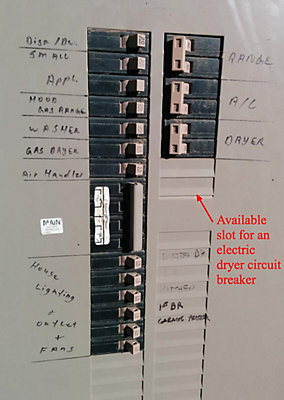How Much Does It Cost to Install a 220V Outlet for My Electric Dryer?
This guide empowers you with the knowledge to make informed decisions regarding electrical dryer outlet installation. While costs can vary depending on your location and specific needs, this guide focuses on the educational aspects to empower you.
Some factors that can influence the complexity and cost of installing a dryer outlet include:
- The circuit length
- Accessibility
- Whether you need to upgrade your panel
- Labor rates
To help you prepare for this installation, we’ll take a closer look at those 4 cost factors.
Note: Throughout this blog, we’ll refer to a 220-volt outlet but keep in mind that outlets rated 220, 240 or 250 volts are all considered identical. The bottom line is that an electric dryer will need a dedicated 30-amp circuit that connects to either a 220, 240 or 250-volt outlet.
Cost factor #1: The circuit length
The longer the circuit, the more expensive the installation.
The “circuit length” refers to how many feet of wiring runs from the main electrical panel to the location of the outlet. The average circuit length for a dryer is around 30 feet of wiring.
If you want to get a better idea of how long your particular circuit will be, determine where in your home the electrical panel is located. Then, determine how far the panel is from your dryer.
Remember, though, that wiring doesn’t always run “as the crow flies” (i.e., in a straight line from panel to appliance). Sometimes, wiring will need to run along/inside walls, which may increase the length of the circuit.
Cost factor #2: Accessibility
The less accessible the circuit, the more expensive the installation.
Like we mentioned earlier, installing a 220-volt outlet for your dryer requires running wire from your main electrical panel to the dryer’s location. “Accessibility”, in this case, means how easy it is for your electrician to place the wire in an inconspicuous and safe location.
Examples of less accessible installations include:
- Running wire along/around concrete floors
- Installing a circuit in a fully finished home (vs. an unfinished home without drywall)
- Running wire through the attic or between walls
- Running wire up several floors in the house
Cost factor #3: Whether you need to upgrade your main panel
If you need to upgrade your home’s main electrical panel, the cost of the overall project will increase.
To learn more about the factors that affect the cost of an electrical panel upgrade, check out our blog, “How Much Does It Cost to Upgrade an Electrical Panel in Colorado?”
So how do you know if you need to upgrade your main electrical panel? Well, typically, you can tell by locating your main panel (these are usually in a garage, storage room, basement or closet) and checking for any open slots.
For example, in the picture below, the panel has availability for a circuit breaker sized appropriately for an electric dryer.

Keep in mind that all electric dryers need a 30-amp, double-pole circuit breaker (typically, these breakers take up two slots in your panel).
Cost factor #4: Labor rates
Not all electricians charge the same for their labor. For example, some charge by the hour while others charge a flat fee for the entire project.
But regardless of whether an electrician charges hourly vs flat-fee, one standard rule typically applies: the more experience and skill they have, the more the electrician will charge to install your 220-volt outlet.
That said, don’t just pick the electrician that offers the lowest quote. High-quality electrical work may be pricey upfront but typically saves homeowners from expensive repairs and/or electrical mishaps down the road.
Tips to find the best Denver electrician for the job:
- Make sure that the electrician works for a company that’s been around for 10+ years
- Check that the electrician is licensed and insured in the state of Colorado
- Ask the electrician for 2–3 referrals from past, satisfied customers
- Make sure the electrician provides upfront pricing in writing
Related Reading:
Need help from a Colorado Plumbing, Heating, Cooling, or Electrical Specialist?
For your convenience, you can request an appointment in one of two ways:
- Call us at (303) 436-2525 for immediate assistance.
- Click on the button below to schedule your appointment online.
Related Reading
Join Our Email Newsletter
Receive updates, current news, promotions, and industry tips.
